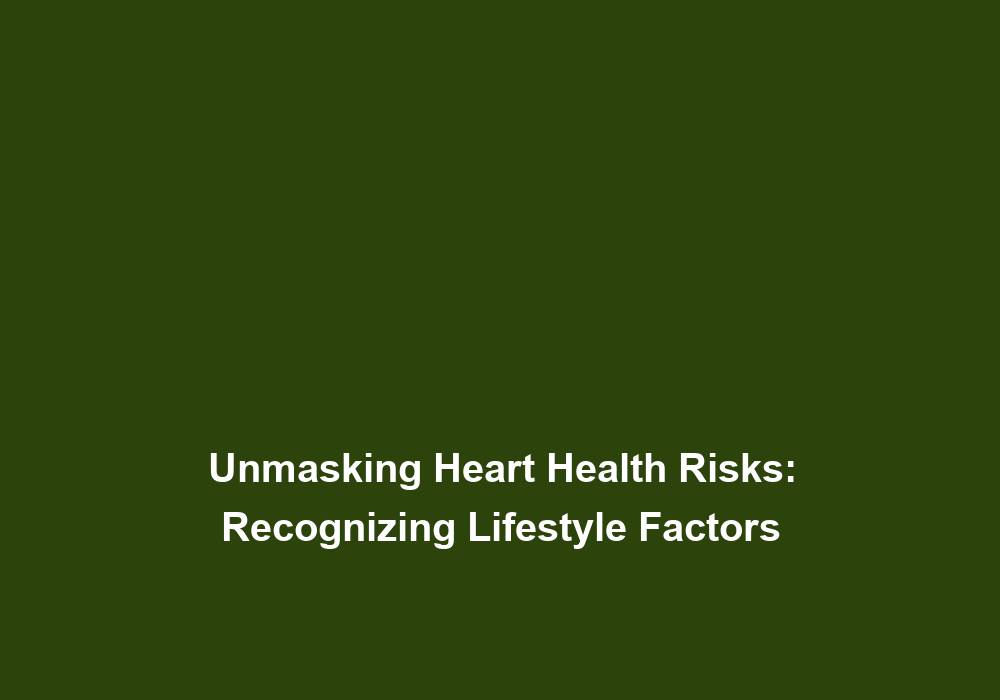Unmasking Heart Health Risks: Recognizing Lifestyle Factors
Heart health is a crucial aspect of overall well-being, and understanding the lifestyle factors that contribute to heart disease is essential for maintaining a healthy heart. In this article, we will delve into the various lifestyle factors that can negatively impact heart health, ultimately unmasking the hidden risks that many individuals may not be aware of. By recognizing these risks and making necessary lifestyle changes, individuals can take proactive steps towards preventing heart disease.
Sedentary Lifestyle: The Silent Enemy
One of the leading lifestyle factors that significantly impacts heart health is a sedentary lifestyle. In today’s modern era, where technology has made our lives more convenient, physical activity has taken a backseat for many individuals. Prolonged sitting, whether at work or during leisure time, has become the norm. Unfortunately, this lack of physical activity can have severe consequences for cardiovascular health.
Sedentary behavior has been linked to increased risk factors for heart disease such as high blood pressure, obesity, and diabetes. Engaging in regular physical activity is vital for maintaining a healthy heart. Here are some ways to incorporate more physical activity into your daily routine:
- Incorporate at least 30 minutes of moderate-intensity exercise, such as brisk walking, jogging, or cycling, into your day.
- Take breaks from sitting every hour and stretch or walk around.
- Use the stairs instead of the elevator whenever possible.
- Engage in activities you enjoy, such as dancing, swimming, or playing a sport, to make exercise more enjoyable and sustainable.
By making these simple changes, you can significantly reduce your risk of heart disease and improve your overall well-being.
Unhealthy Eating Habits: Fueling Heart Disease
Another critical lifestyle factor that can unmask heart health risks is an unhealthy diet. Poor eating habits that include excessive consumption of saturated fats, trans fats, cholesterol, sodium, and added sugars can wreak havoc on cardiovascular health.
A diet high in processed foods, sugary beverages, fast food, and high-calorie snacks can lead to weight gain, high blood pressure, and high cholesterol levels. These risk factors significantly increase the chances of developing heart disease. To promote a heart-healthy diet, consider the following tips:
- Increase your intake of fruits and vegetables, which are rich in essential vitamins, minerals, and antioxidants that support heart health.
- Opt for whole grains, such as brown rice, whole wheat bread, and oats, which provide fiber and help lower cholesterol levels.
- Choose lean proteins like skinless poultry, fish, beans, and legumes, instead of fatty meats.
- Incorporate healthy fats, such as avocados, nuts, and olive oil, into your diet while limiting saturated and trans fats.
- Limit your intake of processed foods, sugary drinks, and high-sodium meals, as they can contribute to heart disease risk.
By adopting a heart-healthy diet and making mindful choices about what you eat, you can significantly reduce your risk of heart disease and improve your overall well-being.
Smoking: The Deadly Habit
Smoking is a well-known risk factor for heart disease, yet many individuals still underestimate its impact. The harmful chemicals in cigarettes can damage the heart and blood vessels, leading to atherosclerosis, a condition characterized by the buildup of plaque in the arteries. This can eventually result in heart attacks, strokes, and other cardiovascular complications.
Quitting smoking is the most effective way to reduce heart disease risk. It may be challenging to overcome this addiction, but various resources and support systems are available to help individuals quit smoking successfully. Consider the following strategies to quit smoking:
- Seek support from friends, family, or a support group to help you stay motivated and accountable.
- Talk to your healthcare provider about medications or nicotine replacement therapy that can aid in smoking cessation.
- Find healthy alternatives to cope with stress or cravings, such as exercise, deep breathing exercises, or engaging in hobbies.
- Remove triggers and temptations by getting rid of cigarettes, lighters, and ashtrays from your environment.
By quitting smoking, you can significantly improve your heart health and overall well-being. Remember that it’s never too late to quit, and every small step towards quitting counts.
Chronic Stress: A Silent Culprit
Chronic stress has become a prevalent aspect of modern life, and its impact on heart health should not be underestimated. Prolonged exposure to stress can lead to increased blood pressure, elevated heart rate, and inflammation in the body, all of which contribute to the development of heart disease.
Recognizing and managing stress is crucial for maintaining a healthy heart. Here are some stress-relieving activities and strategies that can help:
- Practice relaxation techniques such as meditation, deep breathing exercises, or yoga to promote a sense of calm and reduce stress levels.
- Engage in regular physical activity, as exercise releases endorphins that act as natural stress relievers.
- Find time for hobbies or activities you enjoy, such as painting, gardening, or listening to music, to distract yourself from stressors and promote relaxation.
- Seek support from friends, family, or professionals if you feel overwhelmed by chronic stress.
By incorporating these stress-management techniques into your daily routine, you can better cope with stress and protect your heart health.
Obesity: A Growing Concern
Obesity is a major public health concern that significantly contributes to heart disease risk. Excess body weight puts strain on the heart and increases the likelihood of developing conditions such as high blood pressure, high cholesterol levels, and type 2 diabetes.
Preventing obesity and maintaining a healthy weight are crucial for heart health. Here are some tips to achieve and maintain a healthy weight:
- Engage in regular physical activity that includes both cardiovascular exercises, such as jogging, swimming, or cycling, and strength training exercises to build muscle and boost metabolism.
- Follow a balanced diet that includes a variety of nutrient-dense foods, such as fruits, vegetables, whole grains, lean proteins, and healthy fats.
- Practice portion control and mindful eating to avoid overeating and promote healthy weight management.
- Seek support from a healthcare professional or registered dietitian for personalized guidance and advice.
By adopting these lifestyle changes and focusing on maintaining a healthy weight, you can significantly reduce your risk of heart disease and improve your overall well-being.
Alcohol Consumption: Moderation is Key
While moderate alcohol consumption may have some potential cardiovascular benefits, excessive drinking can lead to severe heart health risks. Consuming large amounts of alcohol can elevate blood pressure, increase the risk of arrhythmias, and contribute to obesity.
For individuals who choose to drink alcohol, moderation is key. The American Heart Association recommends limiting alcohol intake to moderate levels, which means up to one drink per day for women and up to two drinks per day for men. However, it is important to note that individuals with certain medical conditions or those who are taking specific medications should avoid alcohol altogether.
By practicing moderation in alcohol consumption and being mindful of your limits, you can enjoy the potential benefits without putting your heart health at risk.
Conclusion
Heart health risks can often be unmasked by recognizing and addressing various lifestyle factors. By incorporating regular physical activity, adopting a heart-healthy diet, quitting smoking, managing stress effectively, maintaining a healthy weight, and practicing moderation in alcohol consumption, individuals can significantly reduce their risk of heart disease. Taking proactive steps towards a heart-healthy lifestyle is essential for long-term well-being and a thriving cardiovascular system.
Please note that this article is for informational purposes only and should not be considered medical advice. For personalized advice regarding heart health, consult with a healthcare professional.







